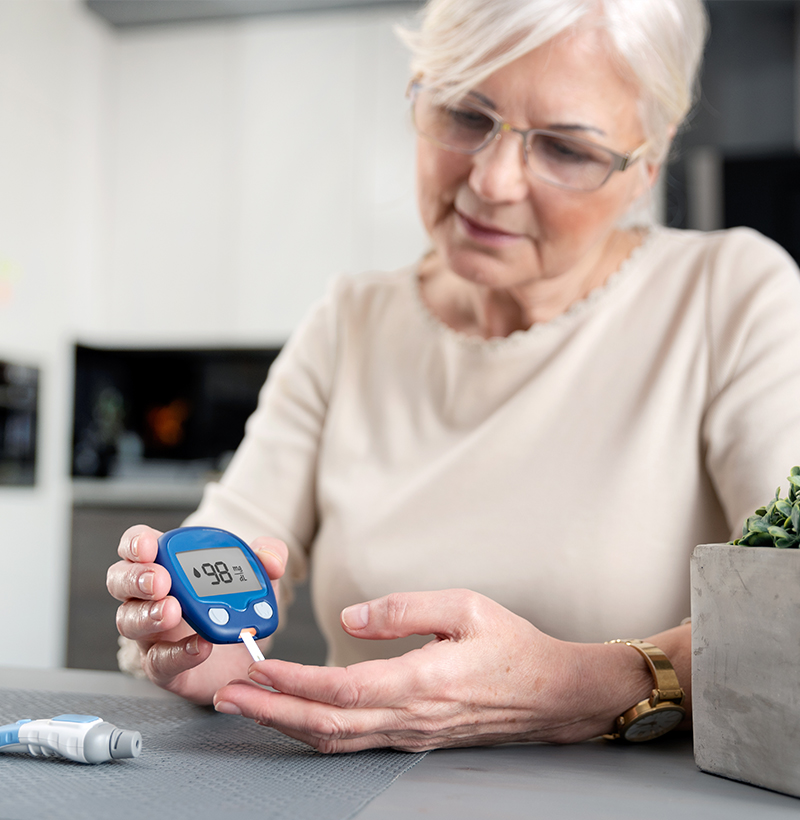What is Diabetes?
Diabetes is a long-term metabolic disorder marked by high blood sugar levels, which stem from the body’s inefficiency in producing or utilizing insulin effectively. Insulin is a vital hormone from the pancreas, essential for regulating blood glucose by aiding its absorption into cells for energy or storage.
How Diabetes Emerges:
The onset of diabetes can be attributed to various factors:
- Autoimmune Response: In Type 1 Diabetes, the immune system erroneously targets and destroys the insulin-producing beta cells in the pancreas, leading to insufficient insulin production.
- Insulin Resistance: The most prevalent, Type 2 Diabetes, arises when cells resist insulin’s effect, causing a spike in blood sugar levels
- Genetics: Both diabetes types have genetic links that predispose individuals to the condition.
- Lifestyle Influences: Factors such as obesity, lack of exercise, and poor diet exacerbate the risk of Type 2 Diabetes by promoting insulin resistance.


Classifying Diabetes:
- Type 1 Diabetes is an autoimmune condition where the immune system mistakenly attacks and destroys the beta cells in the pancreas that produce insulin. This results in little to no insulin production. It often develops in childhood or adolescence but can occur at any age. Patients with Type 1 Diabetes are dependent on daily insulin administration to manage their blood sugar levels. The exact cause of this autoimmune reaction is not fully understood, though genetic and environmental factors are believed to contribute.
- Type 2 Diabetes is the most prevalent form of the disease and is primarily associated with lifestyle factors such as obesity, physical inactivity, and poor diet play a significant role. In this condition, the body either doesn’t produce enough insulin or the cells resist insulin’s action, leading to elevated blood sugar levels. Unlike Type 1, Type 2 Diabetes can sometimes be managed or even reversed with lifestyle modifications, though medications and insulin therapy may still be necessary for some individualsF
- Gestational Diabetes occurs during pregnancy and usually disappears after giving birth. However, it provides a window into a woman’s future risk of developing Type 2 Diabetes. It’s caused by hormonal changes during pregnancy that make the body’s cells more resistant to insulin. Managing Gestational Diabetes is crucial to avoid complications for both the mother and the baby. After pregnancy, women who experienced Gestational Diabetes should continue to monitor their blood sugar levels and maintain a healthy lifestyle to reduce their risk of developing Type 2 Diabetes
Other Forms of Diabetes
In addition to these primary types, there are other, less common forms of diabetes, such as
Monogenic Diabetes
This form includes conditions like neonatal diabetes and maturity-onset diabetes of the young (MODY). It results from mutations in a single gene affecting insulin production or secretion.
Cystic Fibrosis-Related Diabetes
This is a form of diabetes specific to individuals with cystic fibrosis, caused by damage to the pancreas.
Secondary Diabetes
Conditions such as pancreatic disease, hormone imbalances, or the use of certain medications can lead to secondary diabetes, where diabetes is a consequence of another underlying condition.
Each type of diabetes has its own set of challenges and requires a tailored approach to management, including medication, lifestyle adjustments, and regular monitoring of blood glucose levels to ensure optimal health and prevent complications.
The Impact of Type 2 Diabetes on the Body
Type 2 Diabetes, if not meticulously managed, can profoundly affect various bodily organs and systems, leading to a spectrum of potential complications.
Cardiovascular System
Unregulated blood sugar levels can inflict damage on blood vessels, elevating the risk of cardiovascular ailments such as heart disease, stroke, and associated complications.
Neurological System
Elevated glucose levels can lead to neuropathy, a type of nerve damage, manifesting as numbness, tingling sensations, and pain, especially in the limbs.
Renal Function
Type 2 Diabetes has the potential to compromise kidney functionality, possibly culminating in renal failure, which may require interventions such as dialysis or kidney transplantation.
Ophthalmological Health
One of the complications, diabetic retinopathy, can result in significant vision impairment or blindness without timely intervention.
Dermatological Effects
Type 2 Diabetes can exacerbate the risk of skin infections, impede wound healing, and increase the likelihood of developing foot ulcers due to compromised circulation and nerve damage.
Gastrointestinal System
The condition can alter the body’s mechanism for processing and absorbing nutrients, leading to issues like gastroparesis, where stomach emptying is delayed, among other digestive complications.
Manifestations of Type 2 Diabetes
The manifestations of Type 2 Diabetes can vary, influenced by the type and severity of the condition. Commonly observed symptoms include:
Excessive Thirst and Urination (Polyuria)
Elevated glucose levels prompt the body to eliminate excess fluid, resulting in increased thirst and frequent urination.
Fatigue
Inefficiency in utilizing glucose for energy can cause persistent tiredness and weakness.
Visual Disturbances
Blood sugar fluctuations may lead to temporary vision changes or blurred vision.
Impaired Wound Healing
Elevated glucose impairs the body’s healing capabilities and infection resistance.
Neuropathy
Type 2 Diabetes-induced nerve damage can cause sensations of tingling or numbness, particularly in the hands and feet.
Unintentional Weight Loss
In uncontrolled Type 1 diabetes, the body may begin to break down muscle and fat for energy, leading to unexplained weight loss.
It is noteworthy that Type 2 Diabetes symptoms might not be apparent, especially in the initial stages. Hence, regular health screenings and glucose monitoring are essential for early detection and effective Type 2 Diabetes management.

Options For Type 2 Diabetes
At Sarasota Diabetes & Neuropathy Center, we are dedicated to a groundbreaking approach in the treatment of Type 2 Diabetes, focusing on reversing the condition by addressing its root causes. Our innovative strategy moves beyond the conventional treatment paradigms that primarily target symptom management. We delve into the underlying factors contributing to Type 2 Diabetes, leveraging a holistic methodology that encompasses comprehensive lifestyle interventions, nutritional counseling, and personalized medical oversight. This approach has consistently demonstrated remarkable efficacy in significantly reducing blood glucose levels among our patients.
Key highlights of our program include
Targeted Intervention
By focusing on the foundational causes of Type 2 Diabetes, such as insulin resistance and metabolic dysfunction, we aim to restore the body’s natural ability to regulate blood sugar levels effectively. This method has enabled numerous patients to substantially decrease, or in some cases, completely discontinue their dependence on Type 2 Diabetes medications.
Enhanced Well-being
Patients at Sarasota Diabetes & Neuropathy Center frequently report not only improved glycemic control but also a noticeable enhancement in their overall well-being. This includes increased energy levels, sustainable weight loss, and a greater sense of vitality, contributing to a significantly improved quality of life.
Lifestyle Modification
Our clinic provides extensive support for lifestyle changes, including diet modifications, physical activity plans, stress management techniques, and education on managing Type 2 Diabetes. These modifications are crucial for reversing Type 2 Diabetes and are tailored to fit each patient’s unique lifestyle and preferences.
Ongoing Care and Monitoring
Recognizing that reversing Type 2 Diabetes is a dynamic process, we are committed to offering continuous monitoring and support. Regular follow-up consultations allow us to adjust treatment plans as needed and address any new challenges, ensuring sustained progress towards Type 2 Diabetes reversal.
Personalized Medical Support
Under the vigilant care of our expert medical team, patients receive an individualized treatment plan tailored to their specific needs. This plan is supported by thorough laboratory testing and analysis to ensure precise identification of imbalances and deficiencies. Subsequently, we develop personalized supplementation strategies aimed at correcting these deficiencies and optimizing metabolic health.
Working Hours
-
Monday9AM - 12PM, 1:30PM - 6PM
-
Tuesday9AM - 12PM, 1:30PM - 6PM
-
Wednesday9AM - 12PM, 1:30PM - 6PM
-
Thursday9AM - 12PM, 1:30PM - 6PM
-
Friday9AM - 12PM, 1:30PM - 6PM
-
Saturday - SundayCLOSED